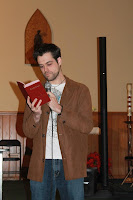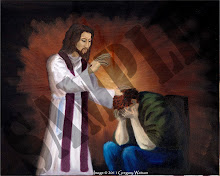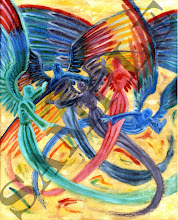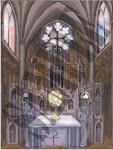By way of a brief introduction, this was a paper I had to write for the hermeneutics course I'm taking right now. The assignment was to sum up the story of the Bible, in narrative form, in just four pages (max), with a font size of 12, double-spaced. I am indebted to St. Augustine's presentation of the faith in his work, "De Catechizandus Rudibus", and to Dr. Scott Hahn's book, "A Father Who Keeps His Promises" for the idea of seven ages and covenants of God's revelation as the theme of Scripture.Out of an overflow of perfect, infinite love, the Almighty God created the world and everyone in it. While perfectly happy and without need, subsisting eternally as a family—the Father, the Son, and the Holy Spirit—God nevertheless desired to create others whom He could love, and who, in turn, could love Him and participate in that divine family. And so, with all the infinite wisdom at His disposal, He fashioned the earth, the sun, the moon, the stars, and all that is. He made all creatures according to their kinds, in an intricate web of interdependent connections. The world itself was like a family, each part dependent on each other, to support life. And over it all, God made Man, in His own image. God gave him special gifts of grace to enable man to live perfectly, and He appointed man to oversee, to protect, and to care for the world and its intricate order. And, having done so, God rested—not because He had grown weary, but so as to make a covenant, the first covenant, with man.
But the man that God had created was himself alone in the world. Alone, the man was unlike God precisely in his solitude. God saw that it was not good for man to be alone, and so He made from his own self a mate, suitable to him, whom the man named Woman. Thus through love, they together imaged God more completely. Marriage in love, fidelity, and unity became a new, second covenant with God and man, and man and woman together.
Man and woman were instructed by God to live the covenant of love and family, with each other, with the world, and with God. He gave them their freedom, so that their love could be genuine, but in their freedom, they failed to love. The enemy of God, Satan, one of God’s own creatures, tempted the woman to love herself more than anyone else, and she in turn tempted the man to do likewise. They failed to love God above all, and to love each other. And so, as a result, the man and the woman lost that original gift of grace. But God promised to one day restore all men and women to covenant with Him.
Yet the original sin of the man and the woman affected their children, whose desires warred in them against the truth and against the good that is to be found in God alone. They were given to pride, envy, greed, wrath, sloth, gluttony, and lust. They lived sinful lives of grave injustice. After many generations of this evil behaviour, God responded in His justice, by destroying His world with a flood. And yet, God’s loving mercy nevertheless spared one man, and his family, because they strove to love Him in return. And thus that family was instructed to build an ark that they would be saved from the flood, as well as a pair of each animal on earth. Saving this family and covenanting with them was the third covenant that God made with Man.
But as that family grew and multiplied, the concupiscence resulting from the loss of that original gift of God continued to draw people away from Him and from His covenant. After several generations, God reached out again to a man, instructing him and his wife to follow Him. Leaving everything, they obeyed God, and, despite their barrenness, God blessed them with a family, and that family grew into a mighty tribe. Through circumcision, they set themselves apart from all the other tribes of the world, as devoted to God alone. And God blessed the tribe, by making the fourth covenant with man.
The tribe grew and prospered, but during the course of time, they fell under hard times, and were forced to leave their land during a famine. Dwelling securely in a foreign land of plenty, they forgot God, until one day they found themselves enslaved by their foreign ruler. Remembering their covenant with God, they cried out to Him, and God heard their cry. He raised up another man to lead them out of slavery, into a land of promise. He gave this man a Law so that this people would be always able to remember their covenant with God and obey Him. And He established this people in a new land, with a new law, as a new nation, and He once more covenanted with them. This is the fifth covenant that God made with man.
The nation continued to grow and prosper when it remained obedient to the Law, but many times the people neglected or ignored the Law of God, and so were chastised by Him. As they dwelled in the land that He had given to them, they saw other nations around them, nations with no knowledge of God or covenant with Him, and they saw how kings ruled these nations. And the covenant nation desired to have a king like the other nations. God warned the people that a king would only cause them grief, but they insisted. So God gave them a king to rule them. The first king ruled poorly and was disobedient to God’s covenant, and so He raised up a new king, who was faithful to God. And God rewarded this king’s faithfulness by making a new covenant with him, that the nation would be a kingdom, and that one of his descendants would always be king, provided that the kings and the kingdom remained faithful to God‘s Law. This was the sixth covenant that God made with man.
As the kings and the kingdom prospered, however, they again abandoned the covenant with God, and God raised up prophets to warn them. But the kings refused to listen, and so God raised up armies against them to drag the kingdom away into exile. But His prophets foretold that if the kingdom repented, God would heal them, and make a new covenant—a perfect covenant.
And after ages passed, and the people returned from exile, they returned to the Law of God and to their covenant with Him. And in the fullness of time, God acted in a new way. He did not simply call a man to lead His people. God Himself became a Man! Out of His infinite love for the world that He had made, God the Son came to show the world how to truly honour the Father, how to live the Law and the covenant that He had made with them. The Son’s name was Jesus, because He had come to save the people from their sins. But the people rejected Him, despite the miracles and the good things He did and taught. And they crucified Him. But before they did, He said to His followers that this was always the plan: to show them God’s love, God Himself would die as a sacrifice for them, so that through His death, and through the resurrection that would come, they might have grace once more to truly live the Covenant. For the covenants that had come before served to show the people that they needed God’s own strength to fully live as family with Him and with each other. And He took bread and wine, and transformed it into His body and blood to be spiritual food for His followers, so that they would receive that divine grace from Him. And Jesus was taken, and beaten, and hung on a cross. And He died, for all of us, that we could be brought back into the family of God.
On the third day, Jesus rose again from the dead, and appeared to His followers. He promised them His Spirit to strengthen them, and His real Presence with them in that spiritual food, the Eucharist. He founded a Church, to go out into the entire world, that all people would know His love and be part of His Covenant, the seventh and perfect Covenant.
The Church He founded isn’t perfect, and those who follow Him often fail. That ancient enemy, Satan, is always seeking to lead us away from Christ, to disobey His Covenant. But through His sacrifice, He has given us seven oaths, or sacraments, by which we can obtain grace from Him to renew and strengthen our family relationship with Him, and live according to His Law, beginning with Baptism, by which anyone can enter into the Family of God through a new, spiritual birth.
And what is more, Jesus has promised that He will return in glory someday. He will judge those who refused to enter into His family, and on the other hand, warmly welcome and embrace all those who are His family! The seventh Covenant will last forever, in a new heaven and earth that will be free from all sin, where we will enjoy eternal Rest with God!











